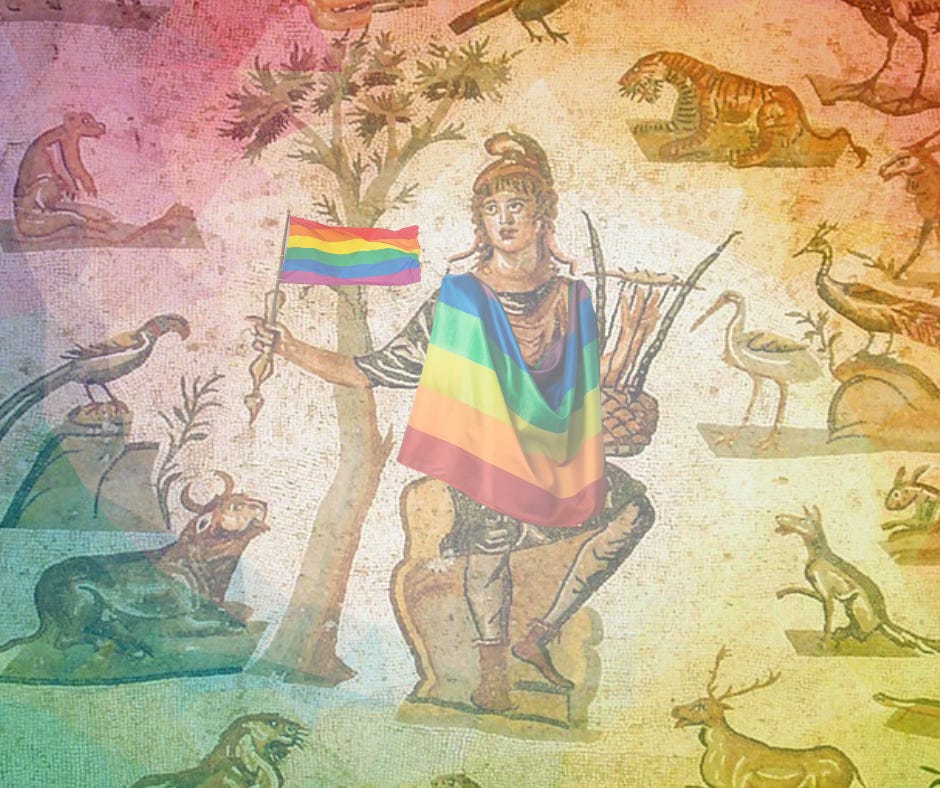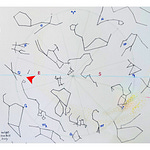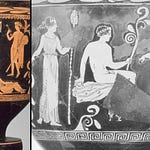For Pride month: this unedited, off-the-cuff audio explores the importance of what I call the Queer Cosmology of the Orphic Hymns, and what it may have to teach us in these times of increasing intolerance, repression, and violence. Read on for more show notes and a list of resources at the end.
Business first: Next Live Chat will be on June 22, at 2pm EDT.
Topic? “The Orphic Hymn of Physis,” the translation of which I’ll release in the days before the chat. Most commonly translated as “Nature,” Physis is more properly read as something along the lines of “The Process of Flourishing Life-Growth.” Much more on that in subsequent posts. Be on the lookout the weekend of the June Solstice!

It is one of the great ironies in the history of myth that Orpheus has become, in the popular imagination, somewhat of a poster boy for heterosexual love. Famously, he is said to have gone to the underworld to retrieve his dead wife, Eurydice, from the grip of Hades. This story, repeated everywhere from Ovid’s Metamorphosis to medieval Breton lais, to 18th century opera, to the recent TV series KAOS, has become canonical.
But what if I told you that a more ancient mythical tradition, repressed for many centuries, told the story of how Orpheus’ queer love for a beautiful youth led to the invention of human song, poetry, magic, and oracular speech?
What if, at the heart of everything we know as “the West” (including, of course, the Christian, Jewish, and Islamicate traditions that emerge out of the melting pot of the Ancient Mediterranean), there is a hopelessly emo, queer, semi-divine man singing about his lost male lover?
This special Pride month audio looks at these forgotten aspects of Orpheus’ myth because, well, frankly, at least in America where I’m posting from, queer folk are increasingly under attack. May this recording be a balm for your soul.
Nota Bene: You’ll hear the sounds of my Brooklyn neighborhood in the background because I’m recording this on my terrace as my cats doze in the background. My Long Covid hampers my ability to professionally edit and smooth out my recordings, so I’ve taken to just letting it all hang out — you get my stumbling over words and you get my background noises and you get my at times awkward phrasing. My hope is that the very “unprofessional” quality of the recording will make you will feel like you’re sitting with me here, and will also help others feel ok about releasing “imperfect” material. The quest for the perfect presentation is its own form of ableism, and I do my best to model the reality of what it means to be someone whose brain still works for some things (translation, teaching), but whose body and executive function capacities are disabled by chronic illness.
Resources Mentioned in the Recording
Orpheus & the Argonautica
For the earliest (surviving) full telling of the Argonaut myth, you can read it online here, but it’s a rather archaic \ translation, and if you’re really into the Argonautica, this translation by Peter Green is the one you want.
Nota bene: The so-called “Orphic Argonautica” is a MUCH, MUCH later work (written at the very earliest in the 4th c. CE) that preserves elements of the earlier Orphic tradition, but also includes many aspects of Late Antique philosophy and theurgy that are not representative of the original Orphic tradition as it first emerged in the 6th century BCE (nearly 1100 years earlier!). It’s a useful text for those interested in the later development of magic and theurgy, but we have to be extremely careful not to infer too much about the early Orphic tradition from it. Even Apollonius’ version of the Argonautica is several centuries removed from the early Orphic tradition we find represented in the Orphic Hymns.
The Story of Orpheus & Kallais
Although elements of Orpheus & Kallais’ story are found elsewhere, the longest fragment we have is from the 3rd c. BCE author Phanocles (as found in the later 4th c. CE author Stobaeus, who quotes from the now-lost Phanocles text). This is a good online parallel Ancient Greek/English version.
Orpheus in Early Greek Art
This Wikipedia collection is a handy place to start if you’re interested in looking at how Orpheus was depicted in early Greek art. Note the absence of Eurydice in these depictions. Even when Orpheus is depicted singing to Pluto and Persephone, Eurydice is nowhere to be found.
One thing I hope you take away from my work is the importance of questioning popular depictions of Greek myth. Whenever you see someone using art to accompany their post, ask yourself: is this art from the same period the writer/blogger is purporting to explain? I cannot tell you how often Ancient Mediterranean myth is whitewashed and “straight-washed” through the blithe assumption that later art accurately depicts the essence of ancient stories.














Share this post